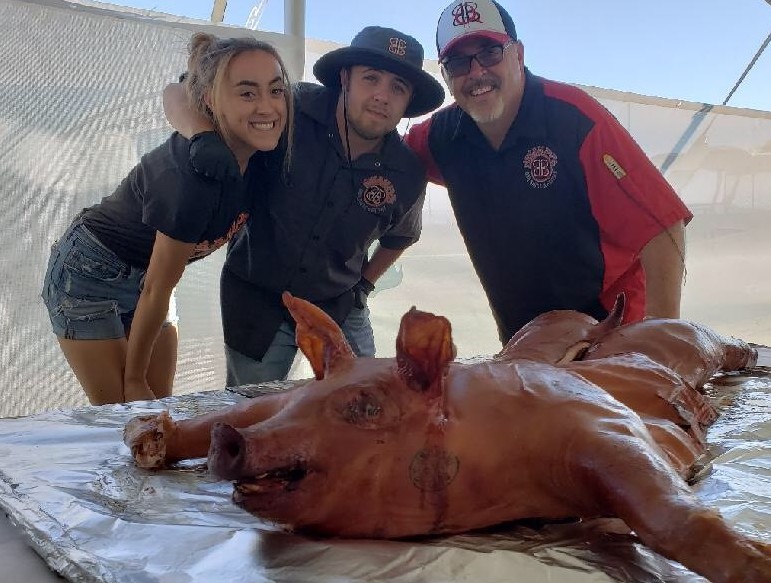Article
How a hairstylist became a barbecue entrepreneur
In the Pacific Northwest, one man's passion for barbecue has evolved into a multifaceted business, including catering, a food truck and barbecue sauce processing.

November 7, 2018 by Elliot Maras — Editor, Kiosk Marketplace & Vending Times
Ron Swanby didn't plan to be in the foodservice business. Like many entrepreneurs, his story is one of circumstance. Today, he runs Swampy's, an extensive barbecue business in Kennewick, Washington, that includes a food truck, several barbecue pits and a barbecue sauce processing operation.
A hairstylist by trade, Swanby's introduction to foodservice began 10 years ago when his church needed someone to prepare meals for its men's gatherings. He asked a friend who owned a barbecue pit if he could borrow it, and his friend obliged.
"We gave it a shot, and they loved it," he said. "I started barbecuing on the pit, and a couple years later, I had my own pit built." He attributes part of his success to the fact that barbecue fare is becoming popular in the Pacific Northwest.
 |
| Assisting Ron Swanby, right, are his children, Analisa and Cadron Swanby. |
Swanby's friend showed him how to make barbecue sauce, which soon became his passion. He began experimenting with recipes.
"I took those six ingredients that he used, and I ended up adding 20 more," he said. He describes the resulting barbecue sauce as slightly sweet but full. "It has a vinegar and it has some sweetness. Nothing overpowers," he said. Swampy's BBQ Sauce is available in two versions, original and spicy.
A business takes shape
It wasn't long before friends began to ask Swanby whether they could buy his barbecue sauce, which led to the idea of making it a business. In 2014, he formed a company and rented space in the Pasco Specialty Kitchen, a public kitchen, to process barbecue sauce. He became certified by Washington State and the U.S. Department of Agriculture.
"We have strict guidelines when we're making a barbecue sauce," he said. It is necessary to monitor pH and temperature, in addition to adhering to specific bottling procedures. "It's quite a huge process," he said.
In 2016, Swanby quit hairstyling to start a catering business while he continued to work on his barbecue sauce. He used a 14-foot trailer to haul his 8-foot-long, 37-inch-wide barbecue pit to serve catering events. His wife, Christina, worked for an industrial company to provide a steady income for the family.
The director of the Pasco Specialty Kitchen also happened to be the organizer of a local Food Truck Friday event, and she suggested that Swanby should sell his barbecue there.
Food truck event proves pivotal
Swanby was hesitant, as he didn't have a food truck at the time, but the event organizer insisted. So he sold his barbecue from a 10-foot-square canopy at the event, assisted by several friends and family members. Customer response was positive, and he found himself deluged with catering requests. "It just catapulted us," Swanby said. "Thank God [the event organizer] convinced me to try it, because I had no desire to do it."
One reason for Swanby's success was his ability to serve customers quickly — within 45 seconds — which meant that he could serve as many as 80 people in an hour. Some of the trucks took as long as half an hour to serve a customer.
 |
| Swanby's barbecue hamburger sausage is stuffed, pinwheeled and covered with a bacon lattice. |
"You have to set up a system so you can be most efficient and not jeopardize your quality at all," he said. "The more meals you push out, the more money you make. Food operations are the same across the board, whether you're in a restaurant, whether you're in a 10-by-10-foot tent or whether you're in a food truck."
The Food Truck Friday organizer also happened to be the director of a food truck training course that met at the Pasco Specialty Kitchen. She asked Swanby to be a guest speaker about food operations, including menu planning, product costing, product sourcing and accounting software. Swanby obliged, and continues in this role to the present day.
As his catering business grew, Swanby realized he needed a larger barbecue pit and a vehicle to haul it. Part two in this two-part series will explore Swanby's expansion to larger barbecue pits, a trailer and a food truck. In addition to pursuing his plans to sell his signature barbecue sauce at retail.
About Elliot Maras
Elliot Maras is the editor of Kiosk Marketplace and Vending Times. He brings three decades covering unattended retail and commercial foodservice.
 ChatGPT
ChatGPT Grok
Grok Perplexity
Perplexity Claude
Claude





